|
Do you remember the A-team? It was a popular TV series in the eighties, later made into a film in 2010. (Apologies to younger readers, who may not have seen the series, but it was good fun even though the plots got repetitious.). The series revolved around four Vietnam vets who sorted the bad guys out, helped those in need, and kept one step ahead of the law who didn’t approve of their methods. The most memorable character was Mr T, the mechanic who provided the muscle – he also incidentally wore lots of gold chains and had an interesting hair style. The group was led by Colonel Hannibal Smith who developed the plans and gave direction to the others. His favorite saying was “I love it when a plan comes together”. The 3rd member was Templeton Faceman Peck a suave organizer and con man who could organize anything. The 4th was Murdoch their crazy pilot. All four characters had critical flaws and wouldn’t have been able to operate on their own, yet, when put together in a team they performed impossible missions – even though of course these were only on the TV screen. "Four flawed characters working as a team achieved the impossible" What can contractors learn from the A-team?
"The plan was communicated to the team ensuring they understood what was required from them and the timing."
"Understand the strengths and the weaknesses of those that work for you"
What are the essentials for the A-team on your construction project?Well most would answer to have the best people. My answer is to have the best people for your project. While we all like to work with the strongest employees this isn’t always possible, and anyway for some construction projects it’s inappropriate to use them. Case study: One of my construction projects involved lots of demolition work. We couldn’t start demolishing follow-on sections until we had reinstated and rebuilt the previous one. This was a slow process. We had to work in multiple areas across the facility at the same time with each area requiring its own supervisor. The work was simple, but hazardous because it was in a live industrial facility which was noisy, messy and used a variety of dangerous chemicals. If I had allocated a senior concrete supervisor to each section they would have been frustrated with the slow pace of the works, and with no large volumes of concrete there would have been little job satisfaction for them. Senior supervisors would probably also have come with large teams of workers with inappropriate skills for the tasks. I, therefore, allocated only one senior supervisor to the construction project. One I knew was patient and wouldn’t be frustrated or unhappy with doing the small portions of work. I also knew he would be willing to assist and train junior inexperienced supervisors. We allocated junior supervisors to the other areas of work. Many of these supervisors were newly promoted to the role, happy to work on their own little section, and only controlling a small team in a limited defined area. They also had a senior supervisor on the project who was willing to give them help and advice when required. The construction project was a success because we had a happy team, despite the project not being the most rewarding in terms of constructing interesting and new structures. The new construction supervisors were learning and growing on the project and all of them later developed into fully-fledged supervisors, moving to bigger roles with larger teams on other construction projects. The senior supervisor had job satisfaction knowing he coached and mentored junior supervisors. The project was financially successful since junior supervisors earn considerably less than senior supervisors. Importantly the client was pleased because we had supervisors on each section of works and we achieved a good safety record. "The right person for the project is not always the most experienced or qualified person." Suitability of construction staff is also not just about the experience of a person. An important aspect on a large construction project, where there may be a number of supervisors and engineers, is that each person should be a team player, willing to share equipment, or to help out in other areas. I’ve sometimes had construction supervisors who thought they should have resources allocated full-time to their sections of work and take priority when materials arrived on the construction project. This can be costly and causes dissent with other staff. On occasion a supervisor possibly will, due to the size and complexity of the construction project, have to report to a more senior supervisor. This might not suit some who have been used to working alone on smaller projects - again, causing problems. Individuals need to be adaptable when the situation requires. Of course, individuals must be able to make a meaningful contribution to the construction project. It’s pointless placing an individual in a role they cannot fill. Don’t carry dead weight. Are you employing the right people on your construction project? "You may have to adapt your plan to suit the players you have." You may have to adapt your plan to suit the players you have. Successful projects have the right team, a good plan, and communicationSo having the A-team for your construction project doesn’t mean you have to have the very best individuals working for you, rather it means having the right individuals for your particular construction project - people that can work harmoniously together as a team, complimenting each other’s experience and knowledge. What you should consider when staffing your construction project. "Without proper communication and direction the team won’t be the A-team" Furthermore, without proper communication and direction the team won’t be the A-team, rather just a group of people performing tasks which may or may not lead to the desired goal. Successful construction demands good communication More importantly the team needs a plan. A plan that ensures the construction project has the required resources on time. Don’t you love it when a plan comes together, and a construction project is successfully completed? This article was first published on the ClockShark website - Get The Industries' #1 Time-Tracking AppRunning a field service or construction business takes coordination and a great team. With ClockShark you get the industries' #1 timesheet app "This book helps with practical tips learned from real experiences. A must read book for the people who are involved in construction projects, especially project managers." (Reader - Amazon.com) To read more about the author’s books and find out where you can purchase them visit the pages on this website by clicking the links below:
'Successful Construction Project Management: The Practical Guide' 'Building a Successful Construction Company: The Practical Guide' 'Construction Book reviews' To read more about the author visit the page 'Paul Netscher' Want to contact Paul Netscher please enter your details on 'Contacts' Find out how Paul Netscher can help you Order your books from Amazon Order your books from Amazon UK © 2023 This article is not to be reproduced for commercial purposes without written permission from the author.
1 Comment
Project cost reports are useful and can supply contractors with valuable information. Last week I published a post ’10 Reasons why you should prepare project cost reports’. Readers seemed to agree that project cost reports were essential. Unfortunately some cost reports can be complex and time consuming to prepare. I’ve known some companies with cost reports that took several days to prepare. You couldn’t find the Project Manager for two days as he was locked away in his office trying to complete his report before month end. This meant that things went unattended on the project while the cost report took priority. Then when the report was completed nobody bothered to read it because it was too lengthy and difficult to interpret. Furthermore contractors sometimes make errors in their cost reports which then provide the wrong information. Occasionally management ignores the cost report and doesn’t take action to figure out why the project is incurring losses or they misinterpret what the cost report is showing. In extreme cases I’ve known managers instruct that losses shouldn't be shown. Some Project Managers leave the preparation and interpretation of the cost report entirely to their Quantity Surveyor or Contract Administrators and pay scant attention to the end report. They view it as just another document produced for their senior managers. Don't make these 10 mistakes with your construction project cost reportsI’ve found the following problems with costs reports:
Cost reports are a valuable tool for contractors when they are done correctly.Regular construction project cost reports are invaluable and can provide much useful information. However cost reports with the incorrect information can give the project team a false sense of security. It’s essential that cost reports are kept relatively simple and also that companies have accounting systems which quickly and easily provide accurate data to support the cost report. It’s important to investigate anomalies in cost reports. Don’t just take the report at face value. I’ve discussed investigating your losses, but sometimes it’s equally important to investigate where you are making money. You don’t want to find later that where you thought you were profitable you actually aren’t, and there were in fact errors with your report. Financial checks and controls on construction projects Like any useful system the information produced from a cost report must be easy to interpret. This information must be used correctly to uncover losses and either recover the money or at least prevent further loss. The CONSTRUCTION project MANAGER'S financial duties What errors have you uncovered in your cost reports? Do you believe everything on your cost reports? To read more about the author’s books and find out where you can purchase them visit the pages on this website by clicking the links below:
'Successful Construction Project Management: The Practical Guide' 'Building a Successful Construction Company: The Practical Guide' 'Construction Book reviews' To read more about the author visit the page 'Paul Netscher' Want to contact Paul Netscher please enter your details on 'Contacts' Find out how Paul Netscher can help you Order your books from Amazon Order your books from Amazon UK © 2016 This article is not to be reproduced for commercial purposes without written permission from the author. "Are you listening?" Are you listening? Or is it your way or the highway? Do you listen to other people’s ideas? Do you do things the same way as you have always? "Wars have been fought between groups who have been so convinced they were right that they could see no compromise." I’ve seen some managers who only see ‘black and white’. There is no ‘grey’. Unfortunately life is never as simple. Wars have been fought between groups who have been so convinced they were right that they could see no compromise. Construction is often the same and we have to compromise. Of course there are somethings that shouldn’t be compromised in construction such as safety and quality. But, the simple act of listening and considering another’s opinion may be enough to convince you that you aren’t right, or possibly that it’s not actually worth fighting a war over – getting into an argument that may just cost you a customer, might damage your reputation or may negatively impact your relationship with a supplier, subcontractor or employee. Good communication is essential in construction We can all learn in constructionThere are some people who believe only they know what’s best. They’ll either rudely dismiss another’s opinion, or politely listen and then carry on as they think best. They are either so arrogant that they don’t believe anyone else could have a better suggestion, or too stupid to realise they aren’t as brilliant as they think. They truly believe they have an abundance of poise, charm and natural talents and believe they’re special, when in fact the opposite is probably true and they’re quite boorish. Yes, others too have opinions, knowledge and expertise. Even with 28 years of construction experience I know I can learn from others. "We cannot sit back and say we’re doing it like this because that’s the way we have always done it." Construction is a team effort and no one can do everything themselves. Also no one can know every facet of construction. Furthermore construction is evolving with new methods, equipment, technology and materials. Our customers are expecting more from contractors these days – unfortunately often more paperwork, lower prices and quicker build times. We cannot sit back and say we’re doing it like this because that’s the way we have always done it, or it worked for me in the past so there’s no reason why I should change. Business is different these days. Our employees are different – they’re all tech savvy. We have to become smarter. It may mean we need to listen more. Why ignoring the opinion of others may harm your construction project Invariably people who don’t listen to others come unstuck.
"Employees get tired of offering solutions and suggestions which aren’t listened to."
Listening makes better construction managersListening to others doesn’t mean you have to believe them or follow as they suggest. In construction we frequently work with older and more experienced Supervisors and Craftspeople. They sometimes know what’s best, but often they (like you) may have become fixed in a routine, doing things a certain way – become set in their ways. They resent being told to do things differently. But, if you genuinely believe your method is better than theirs, and you have listened to their reasoning you should be able to explain why your methods are better than theirs and convince them to follow your instruction. By understanding why your methods are better they’ll often be more committed and motivated to follow your advice, instead of reluctantly following your instructions, or even possibly ignoring them. Listening improves us and our construction project outcomes."I may not always be right." I should listen more, maybe even compromise when necessary. I’m not as brilliant as I may think, and could learn from others around me. (Shock and horror) – I may not always be right! But listening also provides an insight into others' thoughts and fears. This insight provides us an opportunity to convince others we’re right, and to get their buy-in to our methods. Successful construction demands good communication This article was first published on the ClockShark website - Get The Industries' #1 Time-Tracking AppRunning a field service or construction business takes coordination and a great team. With ClockShark you get the industries' #1 timesheet app Paul Netscher has written several easy to read books for owners, contractors, construction managers, construction supervisors and foremen. They cover all aspects of construction management and are filled with tips and insights.
Visit to read more. The books are available in paper and ebook from most online stores including Amazon. Some time ago I watched a program called Resort Rescue followed by Hotel Impossible. The programs visit hotels which are performing poorly and suggest improvements. Now I know there are many similar programs from reviving restaurants, businesses, hotels, shops, etc. Many follow similar lines. But can construction learn from them? In these programs the hotels were generally a mess and the rooms were sometimes dirty and in a poor state of repair. Service was poor – sometimes even rude. Customers were writing bad reviews. I’m sure you wouldn’t have stayed there! In one program they installed cameras around the hotel to record what employees did as they went about their work. What happened shocked owners. Employees were seen stealing liquor, smoking pot and drinking alcohol on duty, they goofed off watching their favorite soaps on TV instead of cleaning the rooms. One chef microwaved all the food (including burgers). Others were disinterested, provided poor customer service and did whatever they wanted. "Do you know what your employees are up to while they should be working?" It got me wondering – do you know what your employees are up to while they should be working? Are they stealing from you – both physically as well as company time? Are they doing their work safely, productively and delivering the quality product both you and your customers expect? Corruption, Fraud and Theft in Construction Now I’m not advocating you rush out and install cameras around your construction projects, even though this might provide interesting information. But every good project manager, supervisor and construction manager knows what their crews are doing. They’re regularly in the field checking quality, safety and productivity. They know when someone in the crew is goofing off, arrived late or left early. Generally good managers have a decent relationship with their crews and know when something isn’t right. Are you a manager who sits in the office doing paperwork and attending meetings, or are you out in the field a couple of times in the day? "Some managers walk the project but fail to see obvious problems because they aren’t paying attention to what's going on." I also know some managers that walk the project but fail to see obvious problems because they aren’t really paying attention to what's going on. Maybe they don’t know any better, but often it’s just because they’re preoccupied with their own world – a world of telephone calls and meetings. Watching these programs reminded me how most of our problems in construction are caused by people. Although the hotel industry may seem distant from construction, I was surprised by how many problems were similar. I guess most industries have similar people related problems. How people can wreck your construction project and your company.
"I’ve seen construction companies employ or promote people to positions they weren’t capable of filling."
"Proper safety and quality controls and checking needs to be set-up on your projects."
"Look at the product you are selling and ask yourself if you are a customer would you be satisfied with what you are offering."
Now all of the above could have applied to most businesses, and in particular to construction. But good employees are the glue that holds your project together What was also very apparent from the hotels was that many employees did a fantastic job, sometimes going beyond the call of duty. Without their loyalty and dedication the hotel would have closed. They were the very glue holding everything together. Yet, owners don’t always appreciate how valuable these employees are. They aren’t adequately rewarded – often not even being thanked. Their conditions of employment are poor. They aren’t given opportunities to take on more responsibility, to grow and to add more to the company. Learn to recognise these diamond employees and look after them. The more diamonds your company has the more rewards you’ll get. Don’t let a diamond slip through your fingers. Construction project rescueUsing the lessons above why don’t you start your project rescue plan. Let’s try construction project rescue, or maybe construction company rescue. Begin by having a good look at what your crews are doing. Are they delivering the project with the desired quality, safety and productivity? Do you have the right people in the right positions? Do they know what’s expected from them? Do they have the proper training? Are you utilising the best systems and equipment? Are you delivering a product that your customers want? Maybe it’s even time to call in an expert? Fresh eyes often see the obvious problems which you miss because you accept them as normal. Well, the old normal isn’t the new normal. Take action now to rescue and improve your construction projects. #constructionprojects #constructionpeople #construction #constructionmanagement This article was first published on the ClockShark website - Get The Industries' #1 Time-Tracking AppRunning a field service or construction business takes coordination and a great team. With ClockShark you get the industries' #1 timesheet app "Take action now to rescue and improve your construction projects." Paul Netscher has written several easy to read books for owners, contractors, construction managers, construction supervisors and foremen. They cover all aspects of construction management and are filled with tips and insights.
Visit to read more. The books are available in paper and ebook from most online stores including Amazon. Some construction companies, especially smaller ones haven’t a clue whether they’re making or losing money on individual projects. They think it’s too tiresome to produce cost reports for each project. Some contractors just look at their bank accounts at the end of the month and if there’s cash in the bank they’re happy. "Some construction companies, especially smaller ones haven’t a clue whether they’re making or losing money on individual projects." What is a construction project cost report?Cost reports usually compare the costs spent on the construction project with the income earned. Usually these cost reports allow contractors to break the cost and income down into separate cost codes. Contractors can then compare costs versus income for labour, equipment and various materials. Some reports can be quite detailed and break the report down even further to different types of labour and equipment. There are dangers of breaking cost reports down into too many different categories as it can become difficult to monitor, which inevitably leads to errors. Cost reports are usually done on a monthly basis. However they can be done more frequently, even done daily for a particular task. Contractors often don’t do cost reports as they believe they take time and one needs computer access. Yet, I have done simple exercises in the field on a daily basis. So for instance, on a bulk earthworks job if you know what each item of equipment costs it’s easy to work out the hourly cost of the equipment team (say excavator and trucks). If you know how many cubic metres of earth the team is moving in an hour it’s simple to calculate the cost per cubic metre. What do you do when your construction project is LOSING money? "Project cost reports help uncover material wastage and theft" Why project cost reports are usefulProject cost reports can yield much useful information. They often save contractors money, or help contractors make more money. I’ve always done monthly project cost reports and found them useful for a number of reasons. They:
Know if your construction money is losing moneyAn accurate cost report is a useful tool on construction projects providing information on where the project is making and losing money. Unfortunately many cost reports are poorly done or the information is ignored which can lead to problems. I’ll deal with cost reporting errors in my next post. 'Avoid these 10 cost report errors' Do you prepare project cost reports? Have you found them useful? #constructionprofits #constructionmanagement #contractors #constructionfinances To read more about the author’s books and find out where you can purchase them visit the pages on this website by clicking the links below:
'Successful Construction Project Management: The Practical Guide' 'Building a Successful Construction Company: The Practical Guide' 'Construction Book reviews' To read more about the author visit the page 'Paul Netscher' Want to contact Paul Netscher please enter your details on 'Contacts' Find out how Paul Netscher can help you Order your books from Amazon Order your books from Amazon UK © 2016 This article is not to be reproduced for commercial purposes without written permission from the author. |
Archives
June 2024
Note: We welcome genuine comments, especially comments that add additional information to the subject matter in the article. We however reserve the right to remove inappropriate comments, which includes comments that have nothing to do with the subject, comments that include inappropriate language, and comments that are an advertisement for a product or company, or which include an advertising link. Comments must be in English. We will not enter into discussion on why a particular comment was removed.
CategoriesCopyright 2016 - The attached articles cannot be reproduced for commercial purposes without the consent of the author.
The opinions expressed in the attached articles are those of the writer. It should be noted that projects are varied and different laws and restrictions apply which depend on the location of the contractor and the project. It's important that the reader uses the supplied information taking cognisance of their particular circumstances. The writer assumes no responsibility or liability for any loss of any kind arising from the reader using the information or advice contained herein. "I have what I consider some of the best books on construction management."
Books are available from: Amazon.com Amazon.co.uk takealot.com kalahari.com Amazon.in Amazon.de Amazon.fr Amazon.it Amazon.com.au Powell's Fishpond uread bokus Amazon.ca Amazon.es Other retail stores Available in paperback or on Kindle "28 YEARS OF CONSTRUCTION PROJECT MANAGEMENT EXPERIENCE, DEVELOPING SUCCESSFUL CONSTRUCTION PROJECT MANAGERS AND BUILDING SUCCESSFUL CONSTRUCTION COMPANIES"
|
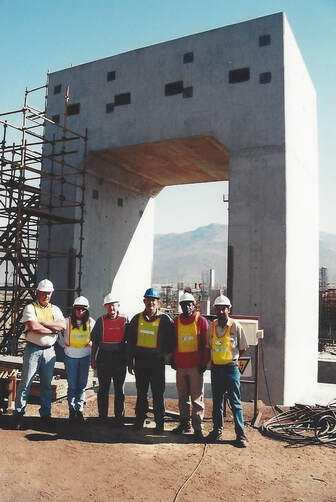




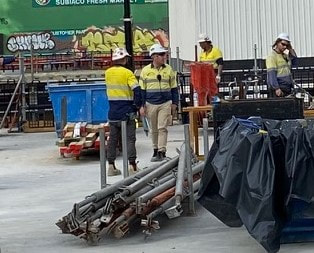
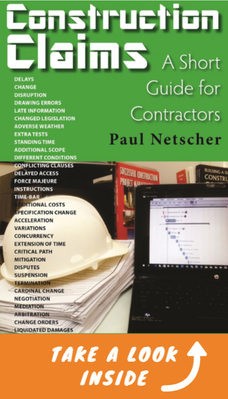
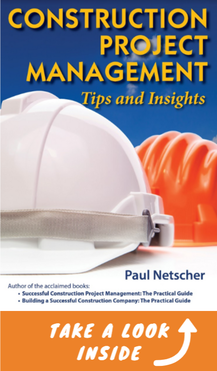

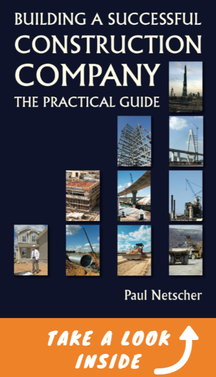



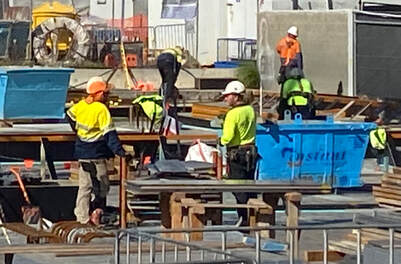


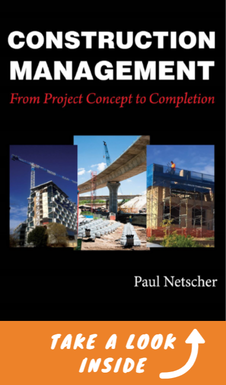

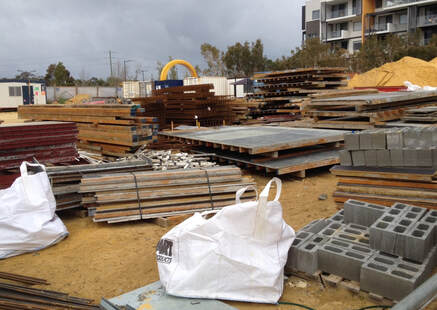
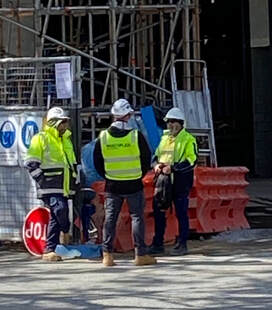


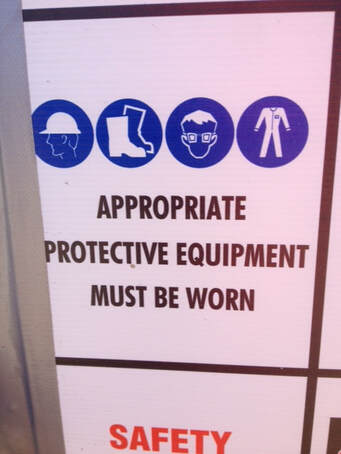

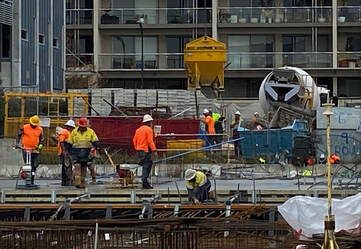
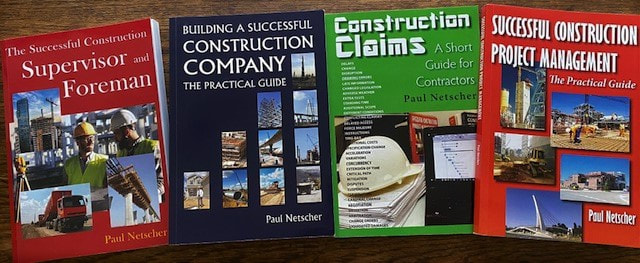

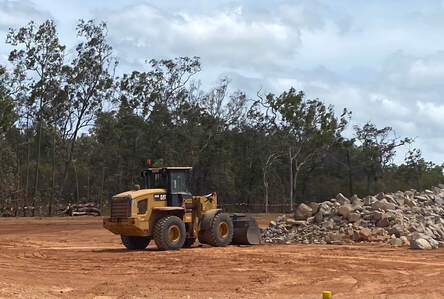
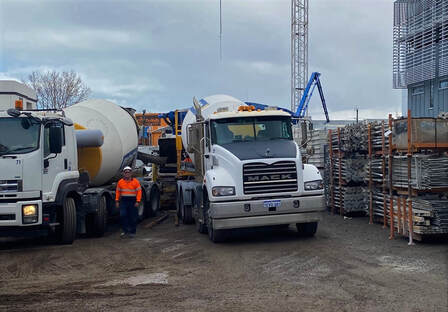


 RSS Feed
RSS Feed




